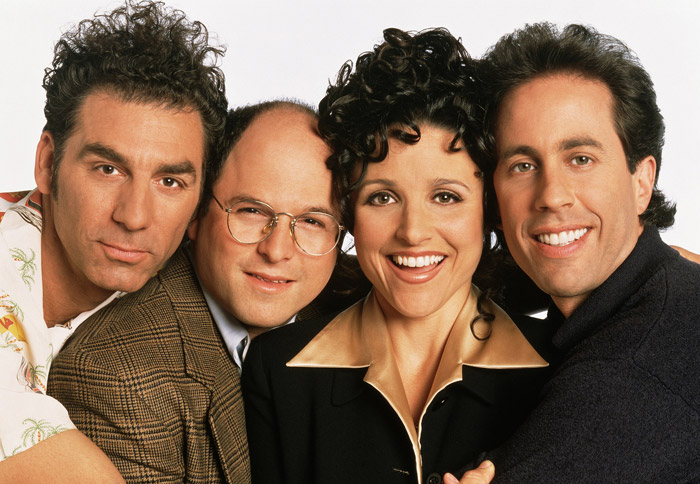People are always saying Seinfeld is a show about nothing. Each episode is centred on the mundane, such as parking garages, rye bread, and fruit. (The peach, cantaloupe, and mango are all important actors in the show). But for a show so famous for its humdrum storylines, Seinfeld managed to tackle a host of wildly controversial issues in its time. From racism and interracial relationships to rape culture and abortion, the show used its signature shallow detachment to provide comedic and insightful commentary on these issues that often goes unnoticed by critics today.
In “The Couch,” Jerry is in the market for a new couch. After Elaine—who is strongly pro-choice—falls madly in love with one of Jerry’s moving men, Jerry slyly asks Elaine what the guy’s stance is on abortion with the hopes of forcing her to dump him on her moral principles. The moving man, of course, is pro-life, and the pained look on Elaine’s face when she finds out and has to break it off is priceless.
Meanwhile, Kramer starts a “make your own pizza” business, (yes, Kramer invented Pannizza), with Poppie, a pro-life restaurateur, but things go sour when the two can’t agree on when a pizza becomes a pizza.
“It’s not a pizza till it comes out of the oven,” Kramer says.
“Issa pizza the moment you put your fists in the dough!” Poppie responds.
The episode tackles the abortion debate head on, and pokes fun at the self-serious sacrifices that people who take religious stances on polarizing issues are forced to make. In trademark fashion, whatever gravity the central narrative manages to build is deflated by a ludicrous meta-narrative in the sub-plot. It’s hilarious, but it’s also provocative—suggesting your stance on abortion has about as much to do with your love life as your definition of when a pizza is ‘born’.
Over its nine seasons, Seinfeld’s treatment of racism was as refreshing as a Junior Mint to the abdominal cavity. In an era when Rodney King and O.J. Simpson were digging up skeletons long thought to be buried in America’s closet, Seinfeld managed to synthesize the nation’s attitude towards race in a perceptive, tongue-in-cheek manner.
In “The Wizard,” Elaine dates a racially ambiguous man, and spends the entire episode trying to find out if he’s actually black in order to make sure she’s reaping the ‘liberal prestige’ from being in an interracial relationship. In the end, we find out that he is in the relationship for the same reason—he thought Elaine was Hispanic. When they find out they’re “just a couple of white people,” they quickly break things off—but not before heading to the Gap. In other episodes, Jerry fails to navigate the minefield of missteps that can come with dating a Native American woman, and Jerry and Elaine elevate the black-and-white cookie to a symbol of post-racial America.
While the show feels ahead of its time with regards to race, it comes across as dated on one of today’s most controversial issues: Rape. Originally aired in 1997, “The Merv Griffin Show” sees Jerry ‘drug’ his girlfriend, Celia, with boxed wine and turkey in order to play with her sacred toy collection. When Celia finds out, she confronts Jerry.
“If you think you can drug me and play with my toys, you’ve got another thing coming!”
Jerry, though, gets the last line in.
“What kind of a woman drinks an entire box of wine?”
Then the laugh track is cued, signaling to the viewers that yes, this is funny. The analogy to date rape is whimsical in itself, but the broader commentary is in line with the form of microaggression that rape culture is built on.
It’s hard to imagine Seinfeld fitting into today’s television landscape, but its influence can be seen in the way many contemporary shows comment on society, from South Park’s false sincerity (“I’ve learned something today”) to It’s Always Sunny In Philadelphia’s self-involved friend group. In order to avoid the sentimentality so prevalent in many ’90s sitcoms, Larry David and Jerry Seinfeld wrote each episode with one cardinal rule: “No hugging, no learning.” The characters cling to their narcissistic ways even after being thrown in jail for their collective wrongdoings in the finale. There are no cathartic moments in Seinfeld, only Jerry reflecting for a second before sighing: “That’s a shame.” From this mantra flowed a unique brand of commentary that was sharp, unexpected, and forced the viewers, not the characters, to ‘deal with it’.








